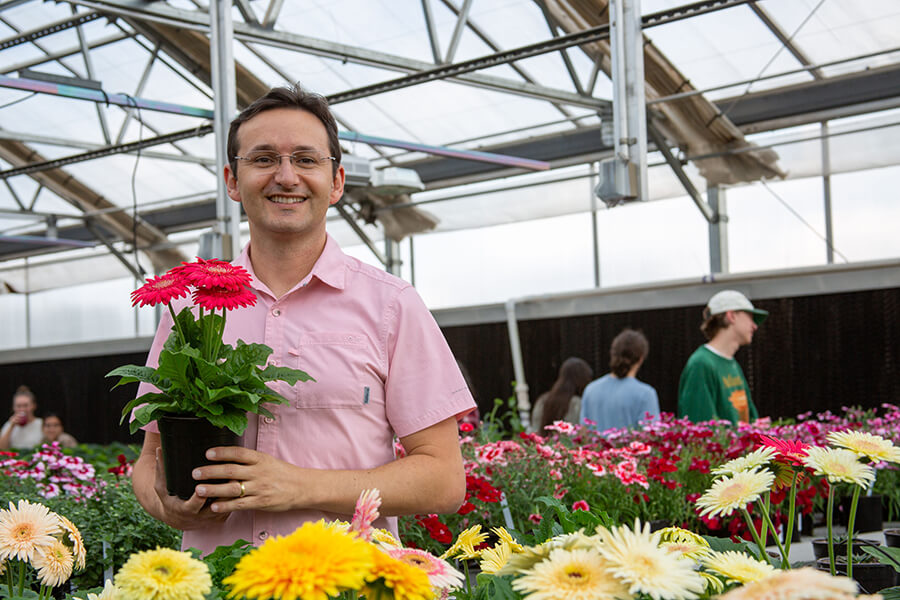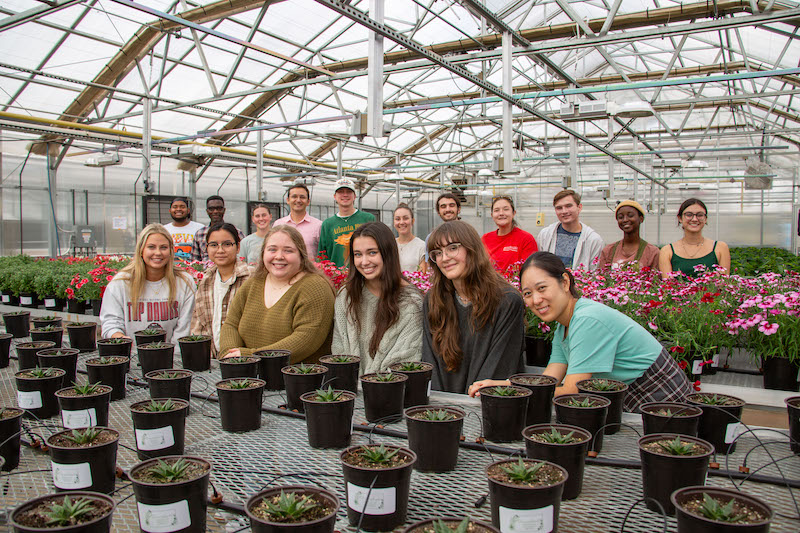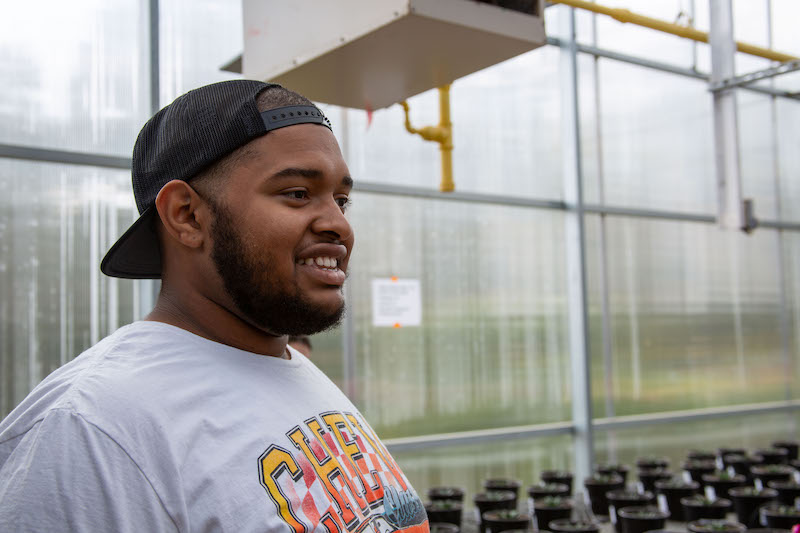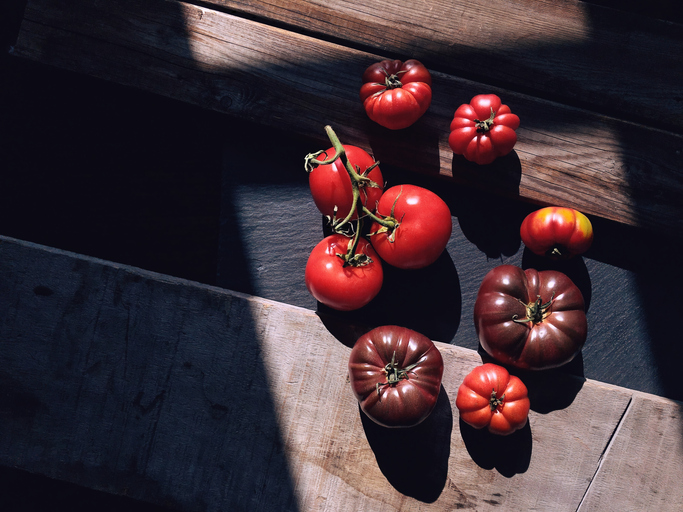
Like proud parents at a recital, undergraduate students in the upper-level University of Georgia “Greenhouse Management” class fussed around the hundreds of daisies, chrysanthemums, Gasteria succulents, snapdragons, dianthus and echinacea they had cultivated for their inaugural plant sale.
The October sale, like the rearing of the plants from seedling plugs donated by green industry partners, was entirely student-planned and implemented. This is a revamped approach to the longstanding course, now taught by Department of Horticulture Associate Professor Rhuanito Ferrarezi, who specializes in controlled environment agriculture.
“The HORT 4050/6050 students cultivated various ornamental plants and organized a plant sale as an integral component of their active and experiential learning curriculum,” said Ferrarezi. Proceeds from the sale will be used to host a luncheon with members of the ornamental industry for students to network and gain perspectives on career opportunities in the green industry.
The sale was also a dress rehearsal for the popular poinsettia sale to be held on Nov. 27 at the UGArden Greenhouse Complex.
While the poinsettia sale has been held in the past, the ornamental sale is new feature of the course, which was initially taught by Professor Emeritus Allan Armitage before his retirement in 2013, then by the late floriculturist and Professor Paul Thomas before his retirement in 2019.
Digging into the course material
Ferrarezi took over the course when he joined the UGA College of Agricultural and Environmental Sciences faculty. After participating in the 2022 Active Learning Summer Institute held by UGA’s Center for Teaching and Learning, he incorporated active learning techniques in his inaugural course in fall 2022 to expand the scope of the class while retooling the student workload to focus on experiential learning.
“The students used to grow up to 20 different kinds of plants and each student was responsible for their own plant variety,” Ferrarezi said. “It was too much work for the students to do as individuals, so we decided to transform the class into more of a group activity.”

Now instead of each student growing the same species and following those plants throughout the growing cycle, the class as a whole is responsible for each of the varieties grown. This semester, the class grew 90 each of the six ornamentals for the first sale, plus 600 poinsettias for the post-Thanksgiving sale.
“During the classroom portion of the course, I teach the science behind growing plants, then the students spend their lab time in the greenhouse putting those lessons into practice,” Ferrarezi said.
Every week throughout the semester, teams of students rotated through the greenhouse, caring for each type of plant being grown for the sales. This inventory included the notoriously finicky poinsettias, which must be closely monitored and managed during the growth cycle to manage growth and prevent damage from pest and diseases.
“Each type of plant they are growing has different requirements for water, fertilizer and light, and the students were responsible for calculating the nutrients applied and managing the plants’ growth cycle to ensure the plants are at the perfect stage based on the timing of the sales,” Ferrarezi said.
Instead of midterms or finals, the students are graded on how well they perform on unit tests, how they care for the plants, how the plants perform and the success of the plant sales.
“These students are not only learning plant production and integrated pest management, but they learn the business of running a greenhouse as well,” Ferrrarezi added. “Every student thinks that horticulture is just the science of how to grow plants, but that part is easy. Then you have to sell the plants. That is what the industry is working on every day. This combines the passion they have for horticulture with a business mindset.”
The future of horticulture
Horticulture major Ansley Morrison said the course has taught her that greenhouse management is as much about engineering as it is growing plants.
“Learning how to build a greenhouse, how the location is critical to the success of the plants, and all of the moving parts that go into a greenhouse has been really interesting — I’ve definitely enjoyed it,” she said.
Carleigh Odell, who is majoring in elementary education and minoring in horticulture, took the class for both personal and professional reasons.
“Growing up, I spent a lot of time with my grandparents in their garden after school. It is a core memory for me,” she said. “I am planning to teach elementary school and I want to create my own after-school club to teach kids how to grow plants.”

Horticulture major Braylen Thompson admits he had no knowledge or interest in agriculture until he moved to Pike County, Georgia, where he participated in an agricultural STEM program in high school.
“I fell in love with it. My original plan was to become a teacher to teach horticulture and agriculture in urban areas,” he said. “You don’t see many kids of color in agriculture, and I would like to help change that. I still want to pursue teaching, but this class has made me want to run my own greenhouse. Maybe I can combine those two things.”
Third-year horticulture major Isabel Pruitt took the “Greenhouse Management” course in tandem with an organic agriculture class at UGArden, the student-run community farm next door to the greenhouse complex.
“It has been interesting learning about the materials and lighting needed in a controlled environment like a greenhouse. I’ve also learned how to grow ornamentals on a larger scale, which is very different from agricultural crops,” Pruitt said. “We have learned by putting theory into practice. We’ve learned how to formulate fertilizers, how to apply plant-growth regulators and how to deal with all different kinds of flowering plants. Our field trips to commercial greenhouses and seeing real-world production has taught us a lot.”
The students’ first sale was a rousing success, selling out everything but mums and raising more than $1,700. On Monday, Nov. 27, the students will be on hand from 1:30 to 5:30 p.m. at the UGArden Greenhouse complex at 2510 South Milledge Avenue for the poinsettia sale. Red and white varieties will be available for $12 per plant.






